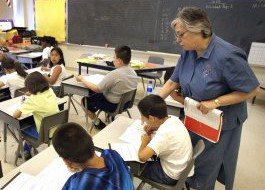 Shutterstock
Shutterstock
Intelligence is good, but empathy is better.
So say 78% of teachers in a new survey released by Sesame Workshop when asked if they'd prefer their students be kind or academically successful.
Likewise, the survey found 73% of parents prefer kindness over academic success, while 26% preferred the reverse.
Sesame Workshop researchers chose kindness as the key theme of the new survey because they saw that narcissism appears to be on the rise while empathy is on the way out. The team wanted to see just how much importance teachers and parents assigned to this waning quality of compassion.
Quite a lot, it turns out.
"Both parents and educators overwhelmingly felt that being kind was more important than having high academic achievement," Jennifer Kotler Clarke, vice president of research and evaluation at Sesame Workshop, told NPR.
The survey included responses to questions about different sides of kindness from 2,000 parents and 500 teachers around the US. The teachers surveyed taught students from preschool to 6th grade, and the parents had children between the ages of 3 and 12.
In addition to empathy, the survey asked teachers and parents about kids' level of politeness, helpfulness, and thoughtfulness. Teachers reported varying levels of each in their students.
For example, 73% of teachers said all or most of their class was kind. But only 52% said all or most of the class was thoughtful — a key ingredient of empathy. Looking at kids' behavior in class, just 44% of teachers said all or most parents were raising their kids to be respectful. And even fewer teachers said parents seemed to be raising kids to be empathetic and kind — just 34%.
Most parents, meanwhile, said they talk to their kids a few times a week about the value of seeing others' points of view. That mismatch is important, since it suggests parents might not be getting through to their kids.
As much as homework and studying are vital to a child's education, the survey suggests parents might want to push their kids to be empathetic, rather than get straight A's.
In the long run, the ability to read a 400-page book might not matter as much as the the ability to read another child's emotions.




